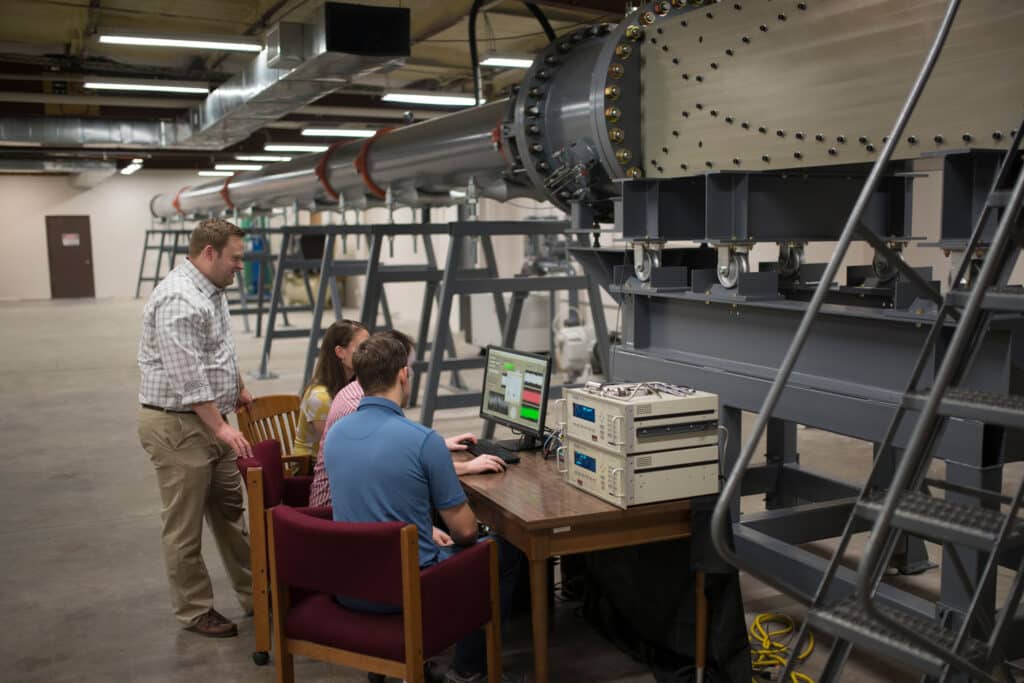
Hypersonics Graduate Certificate
Hypersonics research and application is at the forefront of modern efforts to increase national security, revolutionize air travel, and discover breakthroughs in space exploration. Obtaining a graduate certificate in hypersonics offers students a chance to dive deeper into this critical field of study, laying a foundation for scientific disciplines relevant to hypersonic flight and emerging aerospace systems.
Program overview
The graduate certificate in hypersonics offered by the Department of Mechanical, Aerospace, and Biomedical Engineering, focuses on utilizing scientific disciplines relevant to hypersonic flight for the development of emerging aerospace systems.
Upon receiving their certificate, students will demonstrate the knowledge of the foundational scientific disciplines relevant to hypersonic flight to contribute to the development of emerging aerospace systems. Certificate holders will be able to apply this knowledge in order to understand the significant technical challenges associated with the highly integrated nature of hypersonic systems and to contribute to the multidisciplinary development of such systems.
Why get a certificate in hypersonics?
The Hypersonics Certificate Program is taught by world-class faculty in the Department of Mechanical, Aerospace, and Biomedical Engineering at UT. Graduate certificate programs like this one give students the opportunity to learn under experts in the field as they hone knowledge and application skills in hypersonics, an advanced field of study in aerospace engineering, defense, and high-speed technologies.
In obtaining a certificate in hypersonics, graduate students will significantly enhance their career prospects and skill set, setting them apart in a competitive market seeking forward thinkers and innovators.
What can you do with a certificate in hypersonics?
Receiving a certificate in hypersonics will offer complementary instruction and expertise in the field of aerospace engineering to advance your career and increase earning potential. After completing the certification program, students are positioned for more opportunities in managerial or supervisory roles, with more responsibilities and better compensation. Certificate holders will specialize their knowledge in the growing field of hypersonics technology, receive hands-on learning, and receive a targeted, flexible, and prestigious credential.
Having a hypersonics certificate may set you apart from other candidates in the job market and demonstrate your expertise to continuous learning.
Featured Courses
AE 521 Aerodynamics of Compressible Fluids I
One-dimensional internal and external flow; waves; small perturbation theory; slender body theory; similarity rules; method of characteristics.
AE 532 Introduction to Turbulence
Macroscopic effects, analogies, statistical treatment, correlation functions, energy spectra, diffusion; application of turbulent jets and pipe flow.
AE 569 Plasma Dynamics
Fundamental concepts of plasma including electromagnetic theory, collision processes, kinetic theory, microscopic and macroscopic descriptions, transport properties, and magnetohydrodynamic analysis.
AE 581 Rocket Propulsion I
Rocket propulsion fundamentals; thermodynamics of nonreacting and chemically reacting ideal gases, rocket nozzle design; ideal rocket performance parameters; rocket heat transfer; chemistry of propellants; liquid rocket engine systems; ground testing; introduction to solid propellant rockets.
Related Programs
Check out a list of related programs to look into based on your interest in hypersonics:
Admissions and Aid
Choosing the right university to pursue an engineering degree is an important decision—and a significant investment. We want to make sure that you have the information you need to both apply and make attending UT affordable.


Ready to Join Us?
See yourself on Rocky Top? We’ve made it easier than ever to apply for admission. Learn more about our admission requirements and the steps to apply to be an Engineering Vol.
